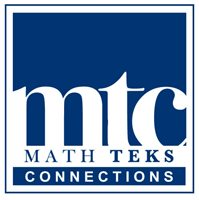Math TEKS Connections (MTC) Training

About
The Math TEKS Connections (MTC) project has created professional development focused on producing deep understanding of math skill standards and the connections among those standards within and across grade levels. Four MTC professional development modules organized by grade band are available for classroom educators: K-2, 3-5, 6-8, and 9-12. An additional module specifically for building and central office administrators is also available. MTC professional development was created in partnership with Texas A&M University,Columbia University (New York), Region IV Education Service Center, Region XIII Education Service Center and the Texas Education Agency (TEA).
Description
Successful mathematics instruction at one grade level is highly dependant on effective instruction at prior grade levels. Good teaching must include knowledge of cross grade and cross concept math connections. The foundational mathematics knowledge that students acquire in early elementary grades directly affects their ability to be successful in Algebra and other upper-level courses much later in their academic careers, and is no less fundamental to subsequent student outcomes than reading skills is.
All MTC modules train math educators to carefully examine math essential knowledge and skills (TEKS) at a particular grade band, and understand in-depth the connections between and among those TEKS (math skills) across grade levels. MTC training also focuses on learning effective, proven teaching techniques that increase instructional efficacy, and on effective techniques for assessing math concept acquisition. Guidance in determining which instructional strategies most effectively address particular math TEKS is also part of the core learning.
The MTC K-2 module goes even further to provide groundbreaking training to K-2 teachers in how to understand and gauge student math proficiency as it is being formed for the first time in the child’s mind. The K-2 module is one of the first of its kind in the nation and brings together preeminent early childhood mathematicians around the topics of understanding the development of children’s mathematical thinking, effectively bridging from concrete to abstract mathematical concepts in the critical strands of place value and addition/subtraction, and using new diagnostic tools to assess student grasp of core math skills.
Resources
- In-person training is available through Education Service Centers (ESCs) and some large school districts.
- Online training is available through the Texas Math Initiative Professional Development Portal.
- Training of Trainer resources are also available through Texas Math Initiative Professional Development Portal.
